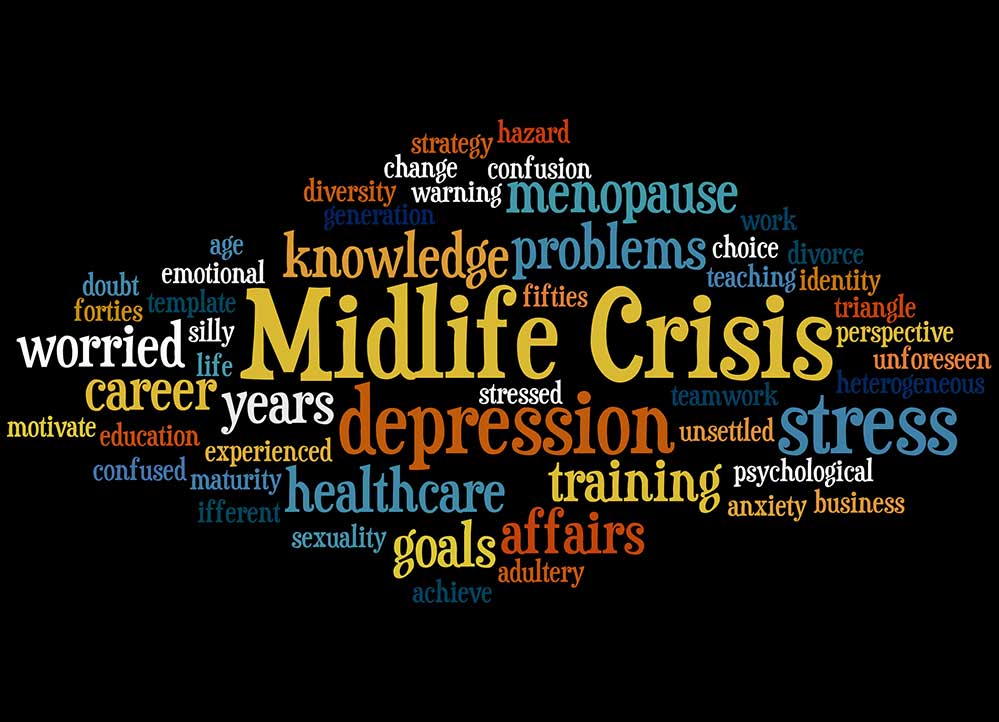There is a running gag about midlife crisis that is perpetuated by countless movies, TV series and even books. Men and women going through said crisis tend to do absolutely ridiculous things to hold on to the idea of youth, making for comedic scenes that engage audiences all over the world. However, those who actually go through a midlife crisis will tell you that there’s nothing funny about what they experience. In fact, the things they do that others find funny are actually actions taken to feel more hopeful about the future, which is increasingly taking them towards older age, and the ultimate inevitable fact of life, death.
But what really is a midlife crisis? Does everyone experience it? And if we all do, how do we overcome it or resolve it? If these are some of the questions you have, you’ve come to the right place. Here’s what you need to know about midlife crisis, and how to overcome it to get a fresh start in life.
Midlife Crisis: How The Concept Came About
In his 2020 book, Balancing The Self: Medicine, Politics And The Regulation Of Health In The Twentieth Century, Mark Jackson dedicates an entire chapter on the midlife crisis and how the term itself came about. He explains how the Canadian psychoanalyst and social scientist, Elliott Jaques, first introduced the term in 1965, even though the concept finally gained popularity in the 1990s. Jaques argued that midlife crisis usually hit people in their mid-to late-thirties, a time when there’s a growing awareness that youth and its promise of dreams have flitted past, while advancing age only brings the prospect of ill health, dependence on younger generations and death closer home.
Over the next decades, Jaques’ theory evolved and others in the field of psychology realised that as life expectancy increased, the idea of middle age—and thereby midlife crisis—must also shift from an issue ailing people in their 30s to those in their 40s and 50s. A 2015 study published in the International Journal of Behavioural Development suggests that the 40s and 50s, which are considered to be middle age now, are a pivotal period in life as they bridge the link between younger and older ages. Those who are middle-aged tend to play a key role as mentors for younger generations and as caregivers for the older generations, and they have a similarly central role at the workplace and in society at large.
Another study based on brain imaging of middle-aged people, published in 2021 in Communications Biology, explains that the structure of the brain undergoes changes during this phase of life, along with other physical changes—like menopause in the case of women—that can lead to feelings of loneliness, hopelessness, loss, etc. All of these, along with the responsibilities of middle age, can together create the experiences we commonly know as midlife crisis. However, it’s important to note here that even today, a midlife crisis is not considered to be a recognised, diagnosable mental illness.

Is Midlife Crisis Even Real?
And that brings us to the critical question—is midlife crisis a real phenomenon? And if it is, why isn’t it taken more seriously by those in the field of mental health, at least to make it a medically recognised health issue? The answer lies in the fact that despite what popular culture and those references of middle-aged people buying flashy red cars, getting cosmetic surgery done or marrying younger people might have you believe, researchers have mostly found the occurrence of a midlife crisis a myth—in fact, an urban, Western myth.
A 2020 study published in the journal American Psychologist suggests that research over the years have shown that only 10 to 20 per cent of people experience a midlife crisis, that too predominantly in developed countries. Most people tend to take a midlife crisis as a normal part of life and instead of dealing with the physical or mental health issues that lead to a crisis-like situation, they go around doing all the things that appear so humorous in movies and shows. There are certainly many challenges that appear in middle age, but there are also many positives associated with this phase of life that people tend to forget once they attribute all of them to a midlife crisis.
For example, the study says, middle-aged people usually have a central, beneficial position at work and at home. These people are usually decision-makers who have a good degree of financial independence and stability. Since their personality and attitude in life is well-formed, they are more self-confident and have better emotional maturity. Though their social network may be getting smaller, middle-aged adults know their minds well enough to have a more trustworthy circle of support among family, friends and community. In fact, the study shows, middle-age is full of new opportunities to expand and explore since this adult is more in control of life than those who are younger or older. These are the people who are successful, productive, and any improvements they make in their life can also benefit those younger or older around them.

Shifting Your Perspective About Midlife
It is therefore clear that if you shift your perspective a little, your midlife is just the time when you can get a fresh start and become more confident in dealing with your life instead of perceiving it as a time of crisis. How to do that? Take the following tips to heart, and work on them.
Take note of your achievements: Take a good look at your life and appreciate all that you have accomplished instead of dwelling on dreams you had as a youngster and couldn’t fulfil. These could be personal achievements or private ones, but we’re sure you have plenty of both.
Take stock of changes: Yes, midlife is a time of change—your kids might have grown up, your career might have plateaued, and you might have elderly parents and in-laws to care for. Instead of thinking of these as negative changes that overburden you, think of them as opportunities. Your kids are leaving home, so that leaves more time for you to focus on yourself. Your career is stable, so maybe you can start your own venture. And caring for the elderly can teach you how to create a better financial and healthcare structure for your old age.
Keep your mind active: Learning never stops, and your middle age can provide you the time and stability to explore new things. Is there a dream in your pipeline that you can explore now better than you could when you were younger? It could be art, a business, or a side hustle that can be financially and socially rewarding, but if you have a dream, this is the time to go get it done instead of letting the idea of a midlife crisis bog you down.
Make your circle stronger: As mentioned before, your midlife is the time when you know what you want, especially when it comes to the people you want to socialise with. Instead of thinking of the handful of friends you have as a let-down because you had more friends when you were younger, get more engaged with them. Now that you are older, think of reconnecting with people who you knew before and might have a lot in common with now. Connecting with these people will make your circle and you much stronger.
Focus on your partner: It is quite common for people to face marital problems during middle age, be it for any reason. However, you need to realise that this is a new stage of life for both of you. So, invest more time and effort in rebuilding a relationship with your partner or spouse. This will not only help you navigate through middle age, but also set you up for a more stable time in your golden years.
Make your health a priority: Most of the issues that give people a crisis-like feeling during midlife have to do with health, both mental and physical. Acknowledge ageing for what it is, and embrace it. A good way to do this is to get a complete health assessment done and discuss crucial areas with your doctor. The same goes for your mental health, so assess your situation and get therapy if you need it.
Get more active: Most people think of ageing as the time of life when you get weaker and less fit. So, getting more physically active and having age-appropriate fitness goals can help you stay physically and mentally motivated—maybe even enough to revitalise your life completely. Don’t think small, like weight loss. Instead, go for larger fitness goals like building good muscle mass and bone density (which can help prevent age-related diseases), preventing hypertension and heart disease, and keeping stress and depression at bay.